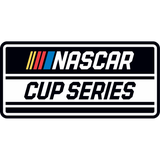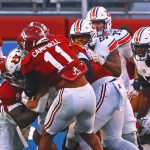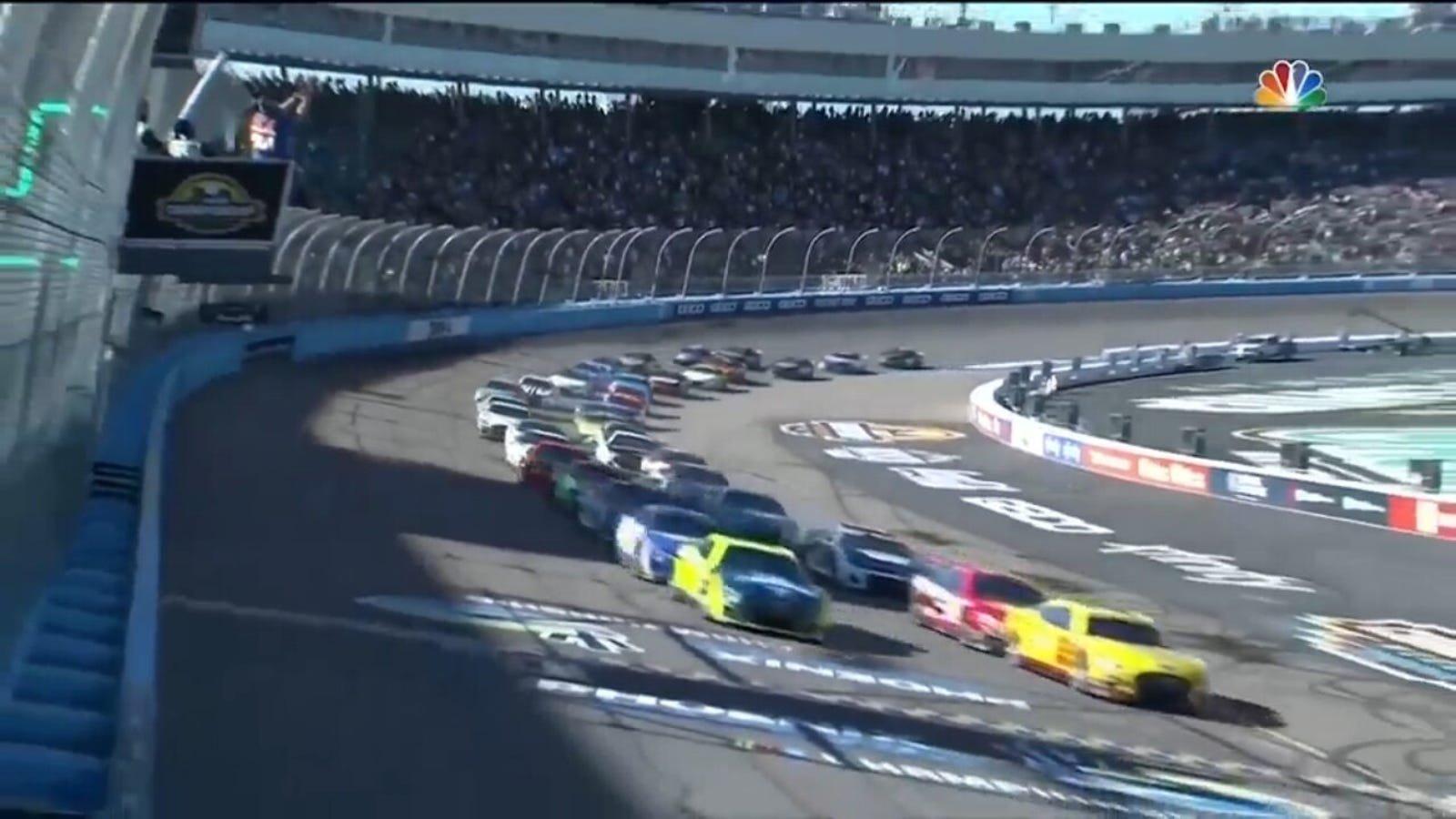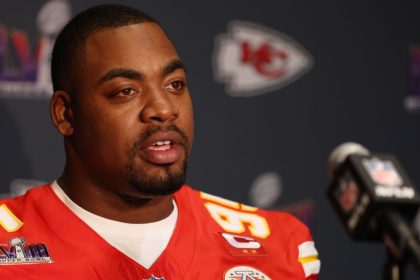As Speedway Motorsports attempts to land a deal to renovate and promote races at the historic Nashville Fairgrounds Speedway, it has seemed like a slog over the past five years.
“You’re saying a slog for government work?” Nashville Mayor John Cooper quipped Nov. 30 when asked if that was an accurate portrayal. “That’s very fast for government. … It will be a process.”
Speedway Motorsports president and CEO Marcus Smith said he’d prefer the term “process” over “slog,” as he is hopeful the proposal gains momentum and that votes that likely will happen in 2023 go his way. He will need elected officials to approve a deal of nearly $100 million in bonds to be paid off primarily from revenue generated by the track.
“This is an opportunity to take an existing facility and remake it, rebuild it … and make it new again in a way that is true to the history and can celebrate and go about the future,” Smith said.
A “process” that has taken five years could be considered close to the finish line or far from it, depending on the perspective.
The track, which would be repaved, would remain a 0.596-mile asphalt oval. Capacity would increase from 12,000 to 30,000 with additional significant upgrades, including compliance with the Americans with Disabilities Act.
The mayor’s office and Speedway Motorsports (through its Bristol Motor Speedway subsidiary) have agreed on two contracts — a development agreement to renovate the facility and a lease agreement for Bristol to operate it for the next 30 years.
Those contracts now must be approved first by the Nashville Board of Fair Commissioners and then by the Nashville Metro Council.
2022 NASCAR Cup Series Championship
Full highlights from the 2022 NASCAR Cup Series Championship from Phoenix Raceway.
It isn’t a matter of whether the track should remain open — in 2011, 71% of the voters approved of a referendum that the fairgrounds, and the track, remain operational. The discussion is whether partnering with Bristol — and the NASCAR Cup Series events that would come with it — is the best use for a facility in a city neighborhood.
The track opened in 1904. Its last Cup race came in 1984, the last Xfinity race in 2000. It continues to run local racing, NASCAR regional series and other major late model events.
“I’m very confident because it’s just such a good deal for Nashville,” Cooper said about the Bristol proposal.
“Here we had this under-invested-in historic racetrack. … With Bristol’s help in this public-private partnership, we can invest in that racetrack for a Cup event and really add to our crown jewels in NASCAR.”
In the past month, the Fair Board has had one workshop and one public comment session on the proposal. It has two workshops and another public hearing scheduled in the coming weeks. A date for a vote has not been set.
If approval is completed by the end of June, it could be possible to host a Cup race there in 2025, said Bristol Motor Speedway president Jerry Caldwell.
The financials are based on having 15 Cup events at the speedway over 30 years (there would be an expected Xfinity race, at least, every year).
Why 15? It seems that Speedway Motorsports is considering some sort of alternating schedule. In its first proposal, it had suggested just 10 Cup events over 30 years.
Looking for more NASCAR content? Sign up for the FOX Sports NASCAR Newsletter with Bob Pockrass!
Speedway Motorsports, which owns 10 current Cup facilities, would be operating two historic tracks in Nashville and North Wilkesboro Speedway in North Carolina and also three tracks in Tennessee in Nashville Fairgrounds, Nashville Superspeedway (about 35 miles outside the city) and Bristol.
“That gives us some flexibility to work in the direction of where we want to go,” Smith said about the 15 Cup event over 30 years proposal. “As we get to closer to actually moving forward, breaking ground on the project, we’ll be able to firm up the plans.”
At the first public response hearing last week, about two dozen people spoke against the proposal and about a dozen spoke for it. Additional people spoke for the proposal at a regularly scheduled fair board meeting Tuesday.
It is not rare for these meetings to bring out emotions and pleas from residents — and the track is a rarity in that it is located in a city neighborhood and not several miles removed from a city and residential area.
According to a text message sent to area residents prior to the first public comment meeting, a group that supports the speedway urged people to go and support it, stating: “Opponents who want to kill the track are organized and will turn out in force. Can we count on you to attend?”
One of those who has been the most vocal has been former fair board member Jason Bergeron, who has said he isn’t against a deal but wants it to be fair.
“This proposal is currently so flawed with minimal protections for Nashville, and also how it threatens to bring … [the] big out-of-control downtown party into the heart of our neighborhoods,” Bergeron told the fair board at its Dec. 8 meeting.
Bergeron said neighborhood residents have “a lot of confusion, fear and hopelessness” about the proposal.
“Do you have the heart and the courage to slow this down, not have it rushed through and then incorporate the kind of financial and community protections that your fellow citizens need to see?” Bergeron asked the fair board.
“I hope you have that heart. And we’re going to be talking a lot more how to accomplish those changes with you in the coming weeks.”
Cooper said partnering with Speedway Motorsports gives the city the ability to bring a Cup event to the track because of its ability to move Cup races among its facilities. The only public money is a $17 million grant from the state plus approximately $17 million paid by the Nashville convention bureau, primarily for events to be held there.
“You’re investing in the future,” Cooper said. “Otherwise, we have to pay for the sound barriers and improvements of the stadium.
“This is a big way where it is not our taxpayers but it’s users who are going to end up paying for the improvements.”
Here is where the proposed deal — and many of the details — stand and why those in favor say it is a user-based payment plan:
- The project is estimated at $116.3 million — $96 million in hard construction costs and $20.3 million in design and development and other costs.
- It is estimated that the city would need to finance $97.26 million by bonds as the state has granted $17 million to the project and Bristol will put $2 million into the design phase.
- Bristol has committed to paying any overruns in design costs over $6 million (the Nashville Convention and Visitors Corp. will put in $4 million), but the city would be on the hook for any overruns if the $97.26 million in bonds are not repaid.
Those bonds are designed to be repaid over the 30 years by revenues generated by the track. Now the sticky part of the conversation: A financial consultant hired by the city projects those revenues to fall $6.5 million short of what is needed to pay back the bonds. Bristol projects less than $1 million short.
Here is where the revenues would come from:
- $1 million annual rent, increasing 1% each year, paid by Bristol.
- $650,000, per year, from the Nashville convention bureau to rent the facility for 20 non-racing events.
- $600,000 in sponsorship revenues per year that Bristol generates, with a 1% escalator (Bristol keeps anything above $600,000).
- 10% of any facility naming rights.
- A $5 per ticket tax (or 10% of ticket price, whichever is lower). The consultant estimates this would generate $1-$1.02-$1.41 million per year; Bristol estimates it at $1.41-$1.55 million per year.
- Sales tax generated by tickets, parking, food and beverage sales, etc. The consultant estimates this at $1.976 million per year; Bristol says $2.646 million.
- 15% of all food and beverage sales. The consultant estimates this at $201,304 per year; Bristol estimates it at $312,617.
- 5% of gross revenue for all race weekends other than the four weekends that Bristol designates are “significant race weekends.” The consultant’s estimate on this is higher — $609,385 per year; Bristol at $377,803.
If there is money left over in revenues generated after paying off the bonds, 75% of it goes to the fair board; 25% to Bristol.
The financials likely will be the biggest point of debate and potential negotiations.
In addition to questions about the financials, the biggest concerns are parking, noise and overall disruption of life for the residents in the neighborhood. A Major League Soccer stadium was built next door to the Fairgrounds, and its debut hasn’t gone the smoothest when it comes to parking and traffic (not atypical for a new facility).
The key elements of the Bristol proposal on these issues:
- 10 weekends of racing, same as there are now, except one would include NASCAR national series.
- Racing events would not include monster trucks, motorcycles, go-karts, etc.
- Reduction of practice days from 25 to 20.
- Creation of 20-foot sound mitigation walls.
- Continued use of mufflers, except for NASCAR national events.
- Cars can only run 3-9 p.m. on Fridays and schedules should have events ending by 10 p.m. on Saturdays and 9 p.m. on Sundays (7 p.m. if there is school on Monday). Cup events would be exempted.
Track financials are more difficult to track than a few years ago now that the tracks are privately owned as the Smith family took Speedway Motorsports private and the France family (through NASCAR) took International Speedway Corp. private. That means track capacities and revenues are no longer disclosed.
But the public documents in the Fairgrounds proposal added a few new tidbits, including:
- Bristol’s current capacity is 127,163. It used to be more than 140,000.
- Using Bristol, Charlotte, Las Vegas and Texas, the 2019 median (not average, but median among those tracks) for Cup races paid attendance was 55,454, for Xfinity it was 28,062, for trucks, it was 20,426.
- From five Speedway Motorsports tracks, their average sponsorship generation was $2.3 million per year.
Thinking Out Loud
One of the more intriguing unknowns going into the Daytona 500 is whether four-time Indy 500 champion Helio Castroneves will run and for what team.
Don Hawk, who runs the SRX Series, told Castroneves if he won a race, he would try to get him a ride. Castroneves won and they are still working on a deal.
The most likely teams are Trackhouse Racing and The Money Team. Both are Chevrolets. Trackhouse would have to add a third car, which it has done in the past, but to do a third car for the Daytona 500 is a significant effort. The Money Team, a part-time team with the support of Floyd Mayweather, doesn’t have the pedigree but has some notoriety.
Hopefully, the deal gets done somewhere. Castroneves is a worldwide star and his fame goes beyond racing. It would be a boost to the sport’s biggest event and add a little extra intrigue.
Social Spotlight
They Said It
“I’m kind of looking at it as the Tom Brady/Peyton Manning aspect where they left great teams, great organizations, where they won championships, and they went on and were able to win championships somewhere else. So I’d like to think that I still have that opportunity to be able to do that with RCR.” —Kyle Busch, on joining Richard Childress Racing in 2023
Top stories from FOX Sports:
Read more from the World Cup:
Bob Pockrass covers NASCAR for FOX Sports. He has spent decades covering motorsports, including the past 30 Daytona 500s, with stints at ESPN, Sporting News, NASCAR Scene magazine and The (Daytona Beach) News-Journal. Follow him on Twitter @bobpockrass, and sign up for the FOX Sports NASCAR Newsletter with Bob Pockrass.

Get more from NASCAR Cup Series Follow your favorites to get information about games, news and more













